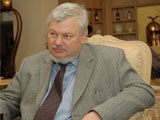|
|
TODAY.AZ / Politics
OSCE: 19 died on the line of contact between Armenian and Azerbaijani armies in 2009
27 March 2010 [09:21] - TODAY.AZ
 Nineteen individuals died on the line of contact between Armenian and Azerbaijani armed forces in 2009, OSCE Chairman-in-Office Personal Representative Andrzej Kasprzyk said in his interview to OSCE Magazine, published on Friday.
Nineteen individuals died on the line of contact between Armenian and Azerbaijani armed forces in 2009, OSCE Chairman-in-Office Personal Representative Andrzej Kasprzyk said in his interview to OSCE Magazine, published on Friday."There are unfortunately a number of casualties each year - approximately 30 (occasionally civilians) - as a result of shooting incidents on the Line of Contact and the Armenian-Azerbaijani border. In 2009, the number of fatalities decreased to 19, almost certainly as a result of the intensity of the negotiations. Each casualty is a tragedy and should be avoided, especially considering that a ceasefire is in place. With regard to the withdrawal of snipers, unfortunately no agreement has been reached on this issue as yet", Andrzej Kasprzyk said.
According to him, the Nagorno-Karabakh conflict cannot be considered "frozen".
"The Nagorno-Karabakh conflict cannot be considered "frozen".
In fact, only the solution is frozen. Since last year we have seen the most intensive phase of the negotiation process to date: the Presidents of Armenia and Azerbaijan met six times in 2009, three times in expanded format with President Medvedev, and once so far in 2010, again in the presence of President Medvedev. The personal involvement of President Medvedev resulted in the first-ever statement on Nagorno-Karabakh signed by the Presidents of Armenia and Azerbaijan - the so-called Moscow Declaration of November 2008", OSCE Chairman-in-Office Personal Representative said.
According to Kasprzyk, "L'Aquila Statement", made by Presidents of the Co-Chair countries, outlines the main elements of the talks at the moment.
"I would like to underline that the Presidents of the Co-Chair countries, when they gathered in L'Aquila for the G8 Summit in July 2009, disclosed the fundamental elements of the Basic Principles that are being negotiated. The so-called "L'Aquila Statement" outlines the main elements of the talks at the moment", he said.
Answering the question about necessity of more public transparency, Andrzej Kasprzyk said that public transparency will certainly be needed when the populations are asked to accept the results of the final negotiations.
/Trend News/
URL: http://www.today.az/news/politics/64800.html
 Print version
Print version
Views: 1275
Connect with us. Get latest news and updates.
See Also
- 06 February 2026 [11:54]
President Ilham Aliyev receives delegation led by Iranian Minister of Defense and Armed Forces - 05 February 2026 [14:46]
Armenian citizen Madat Babayan sentenced to 19 years over Khojaly genocide - 05 February 2026 [14:14]
India has failed Iran and Armenia - competition with the Middle Corridor will not take place - 05 February 2026 [11:11]
Azerbaijan and Armenia in Abu Dhabi - how one leader changed world - 05 February 2026 [10:25]
Footage of Zayed Award for Human Fraternity ceremony posted on President Ilham Aliyev's social media accounts - 04 February 2026 [13:13]
Armenian emblem with two heads - 04 February 2026 [11:11]
Azerbaijan, Armenia and Masdar - 04 February 2026 [09:33]
President Ilham Aliyev held expanded meeting with Armenian Prime Minister in Abu Dhabi - 03 February 2026 [14:14]
Rumors about the Catholicos’ arrest are circulating in Armenia once again, raising the question of their purpose - 03 February 2026 [12:12]
Zangezur corridor become part of TEN-T: European Union is joining fight for South Caucasus
Most Popular
 India has failed Iran and Armenia - competition with the Middle Corridor will not take place
India has failed Iran and Armenia - competition with the Middle Corridor will not take place
 EU prepares 20th Russia sanctions package, Kyrgyzstan faces measures for first time
EU prepares 20th Russia sanctions package, Kyrgyzstan faces measures for first time
 Azerbaijan, Armenia and Masdar
Azerbaijan, Armenia and Masdar
 Azerbaijan and Armenia in Abu Dhabi - how one leader changed world
Azerbaijan and Armenia in Abu Dhabi - how one leader changed world
 Trump alleges Iran nuclear revival while sources say military action on table
Trump alleges Iran nuclear revival while sources say military action on table
 Epstein files blur fact and fiction with shocking Biden ‘replacement’ claim
Epstein files blur fact and fiction with shocking Biden ‘replacement’ claim
 Second round of Russia–Ukraine talks opens in UAE amid escalating tensions
Second round of Russia–Ukraine talks opens in UAE amid escalating tensions
